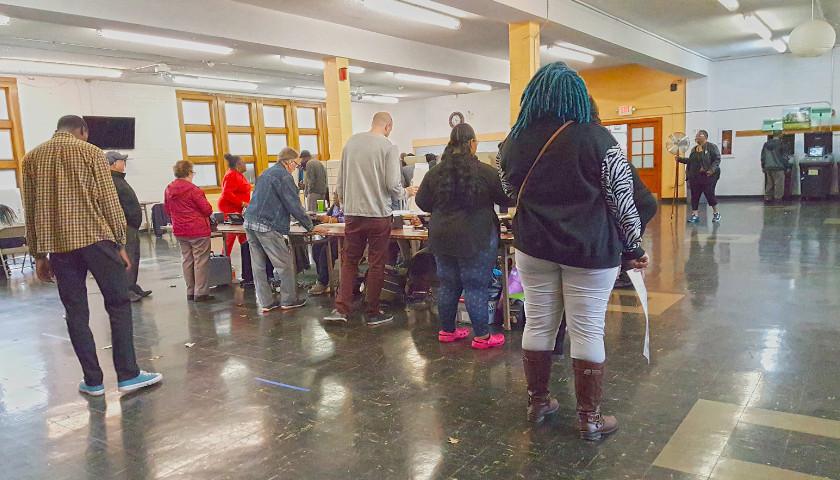A progressive organization called Uplift Campaigns is posting daily updated information on how many Republicans versus Democrats have turned in early ballots all around Arizona. However, A.R.S. 16-551(C) makes it a felony to release any results from early voting before Election Day.
That statute provides in part, “Partial or complete tallies of the early election board shall not be released or divulged before all precincts have reported or one hour after the closing of the polls on election day, whichever occurs first. Any person who unlawfully releases information regarding vote tallies or who possesses a tally sheet or summary without authorization from the recorder or officer in charge of elections is guilty of a class 6 felony.”
Uplift Campaigns’ data page with Arizona results states that the information comes from the “Arizona Democratic Party Voter File and Arizona County Recorders.”
A search of Arizona case law on Google Scholar reveals that no court has addressed whether this activity violates this law.
Uplift Campaigns’ data can be searched by county, congressional, and legislative districts, and includes tallies of independent voters within each as well. The results are updated every day. In Maricopa County on Saturday, the site said 406,768 Republicans have returned their ballots, or almost one-third of Republicans’ registered voters. A far smaller 331,197 Democrats, or fewer than one-quarter of their registered voters, have returned their ballots. Republicans hold a 7 percent voter registration edge over Democrats in the county.
The data also breaks down the returns by age group, with helpful graphs. Older people have returned ballots in far greater numbers than younger people. Gender is also broken down, with women returning more ballots than men.
The site doesn’t appear to be issuing data for any other states or elections; Arizona’s 2024 primary election appears to be their first project.
Uplift Campaigns may believe they found a loophole in A.R.S. 16-168. That statute states that by the 10th day before an election, county recorders shall produce a list of registered voters, which may be provided to political parties’ state and county chairmen. Section (C)(10) of that statute states that the data include “Voting history for all elections in the prior four years and any other information regarding registered voters that the county recorder or city or town clerk maintains electronically and that is public information.” It does not state that this includes forthcoming elections.
Section (C)(11) states that this information include, “All data relating to early voters, including ballot requests and ballot returns.” However, a judge could interpret this law to allow only the release of early voter information in previous elections, since that was the intent of the preceding section (C)(10) and doing so would not conflict with A.R.S. 16-551(C).
Uplift Campaigns appears to have published their data within 10 days of the primary election, since a glance at their website a few days earlier on archive.org does not show the data.
John and Shirley Orton, who serve as precinct committeemen in Pinal County, told The Arizona Sun Times they requested a meeting with Pinal County Recorder Dana Lewis to express their concerns about the practice. They’d heard that two of the Republican candidates they were supporting were behind in their races. When they got to the meeting last Wednesday, the couple said there were two deputy county attorneys and two deputy county sheriffs with Lewis. The couple said they were told to “drop the issue” and that no laws were broken.
Lewis told them that she’d received 13 to 15 requests that morning already from pollsters requesting the data, implying it was routine. Pinal County has been posting the numbers of how many early ballots have been returned, but without breaking it down by party or other demographic.
The Ortons filed a complaint with the Arizona Attorney General’s Office.
Even if their activity is considered legal, it crosses ethics lines for some. A startup tech company called Votecastr emerged in 2016 and provided early results from the presidential election based on how high the turnout was at various locations in key swing states. Journalists were highly critical of the effort, citing ethics concerns. Ken Goldstein, a professor of politics at the University of San Francisco and a member of ABC’s decision desk, told The New York Times at the time, “I’m profoundly uncomfortable with characterizing election results during Election Day.”
In 2000, TV network presidents were summoned to Capitol Hill for questioning about incorrectly calling Florida for Al Gore before voting had ended in the state. The left-leaning Brennan Center pointed out that after exit polls showed that Democrat John Kerry was ahead of George W. Bush in the 2004 election, reportedly causing Democratic voters on the West coast not to show up and vote, the media backed off on revealing that type of information publicly.
Votecastr’s effort was a failure, since the organization got five of the seven states it predicted wrong. Votecastr disappeared shortly afterwards.
– – –
Rachel Alexander is a reporter at The Arizona Sun Times and The Star News Network. Follow Rachel on Twitter / X. Email tips to [email protected].





